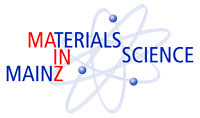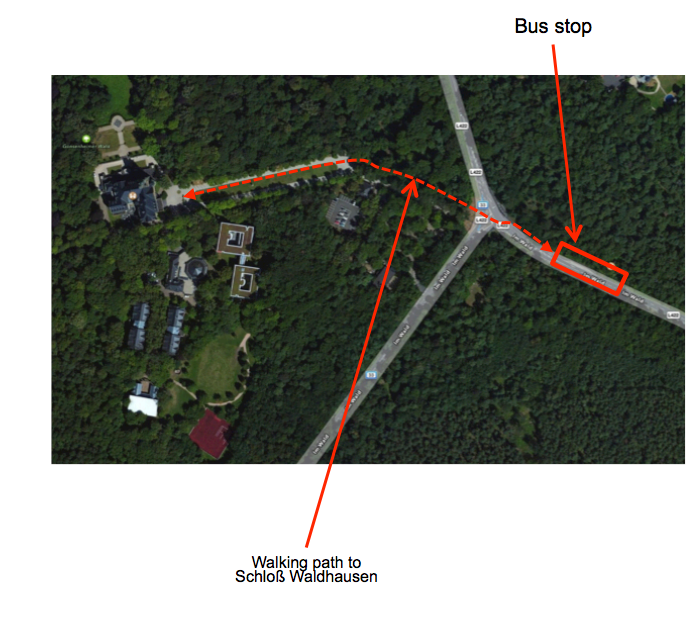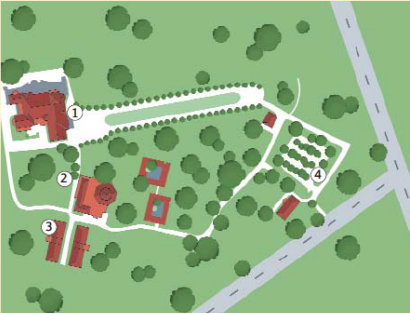Monday, September 26th
|
Morning Session
|
| 08:30 – 09:00 |
Registration
Foyer |
| 09:00 – 09:50 |
Tomas Jungwirth, Prague:
Tutorial: Antiferromagnetic Spintronics Overview |
| 09:50 – 10:10 |
Break |
| 10:10 – 11:00 |
Olena Gomonay, JGU Mainz:
Tutorial: Basic Theory of Antiferromagnetics I |
| 11:00 – 11:20 |
Break |
| 11:20 – 12:10 |
Ulrich Rössler, IFW Dresden:
Tutorial: Introduction to skyrmions in magnets and chiral Dzyaloshinskii textures I |
| 12:10 – 14:00 |
Lunch + Free Discussion Time |
Afternoon Session
|
| 14:00 – 15:00 |
Bryan Gallagher, University of Nottingham:
Tutorial: Antiferromagnetic Materials and Characterization Techniques I |
| 15:00 – 15:20 |
Break |
| 15:20 – 16:20 |
Bryan Gallagher, University of Nottingham:
Tutorial: Antiferromagnetic Materials and Characterization Techniques II |
| 16:20 – 16:40 |
Break |
| 16:40 – 17:30 |
Olena Gomonay, JGU Mainz:
Tutorial: Basic Theory of Antiferromagnetics II |
| 18:30 |
Dinner |
Tuesday, September 27th
|
Morning Session
|
| 08:30 – 09:00 |
Registration
Foyer |
| 09:00 – 09:50 |
Jairo Sinova, JGU Mainz:
Tutorial: Spin-Orbit Torques in Ferromagnets and Antiferromagnets |
| 09:50 – 10:10 |
Break |
| 10:10 – 11:00 |
Hans Huebl, Garching:
Tutorial: Magneto-Transport |
| 11:00 – 11:20 |
Break |
| 11:20 – 12:10 |
Ulrich Rössler, IFW Dresden:
Tutorial: Introduction to skyrmions in magnets and chiral Dzyaloshinskii textures II |
| 12:10 – 14:00 |
Lunch + Free Discussion Time |
Afternoon Session
|
| 14:00 – 14:20 |
Jairo Sinova
Welcome to the Workshop! |
| 14:20 – 14:50 |
Peter Wadley, University of Nottingham:
Current Induced Switching of an Antiferromagnet |
| 14:50 – 15:20 |
Jakub Železný, MPI CPfS:
Spin-orbit torques in locally and globally non-centrosymmetric antiferromagnets |
| 15:20 – 15:40 |
Break |
| 15:40 – 16:10 |
Theo Rasing, Radboud University:
Controlling Antiferromagnetic Spins by Light: From Fundamentals to Nanoscale Engineering |
| 16:10 – 16:40 |
Stefan Günther, ETH Zürich:
Investigation of ultrafast phase transitions in antiferromagnetic and ferromagnetic alloys |
| 16:40 – 17:10 |
Break |
| 17:10 – 17:40 |
Chiara Ciccarelli, University of Cambridge:
Anti-Ferromagnets as Zero Magnetisation Spin-Sources |
| 17:40 – 18:10 |
Tobias Kampfrath, MPI Berlin:
Probing Ultrafast Spin Transport with Terahertz Electromagnetic Pulses |
| 18:30 |
Dinner |
Wednesday, September 28th
|
Morning Session
|
| 09:00 – 09:30 |
Axel Hoffmann, Argonne National Laboratory:
Spin Current Generation and Detection with Antiferromagnets |
| 09:30 – 10:00 |
Yuriy Mokrousov, RWTH Aachen:
Ab-initio Theory of Complex Magnets: From Geometrical Effects to Impurity Scattering |
| 10:00 – 10:20 |
Break |
| 10:20 – 10:50 |
Shunsuke Fukami, Tohoku University:
Field-Free Spin-Orbit Torque Induced Switching in an Antiferromagnet-Ferromagnet Bilayer System |
| 10:50 – 11:20 |
Yaroslav Tserkovnyak, UCLA:
Collective Spin Transport through Antiferromagnets |
| 11:20 – 11:40 |
Break |
| 11:40 – 12:10 |
(cancelled) Ulrich Nowak, University of Konstanz:
Magnonic Spin Currents and their Interaction with Magnetic Textures in Antiferromagnets |
| 12:10 – 14:50 |
Lunch + Poster Session
Please put your poster on the poster stand with the appropriate number. You can find a list of numbers in your brochure on pages 48-50. All posters with the letter W (Wednesday) will be presented today. |
Afternoon Session
|
| 14:50 – 15:20 |
Sebastian Gönnenwein, Dresden:
Spin Hall Magnetoresistance in a Canted Ferrimagnet |
| 15:20 – 15:50 |
Oleg Tretiakov, Tohoku University:
Antiferromagnetic Skyrmions |
| 15:50 – 16:20 |
Break |
| 16:20 – 16:50 |
Vincent Baltz, SPINTEC:
Spin injection and absorption in antiferromagnets |
| 16:50 – 17:20 |
Rembert Duine, University of Utrecht:
Spin-Current Transmission through Antiferromagnets |
| 17:20 – 17:40 |
Break |
| 17:40 – 18:10 |
Matthias Sitte (JGU Mainz), Frank Haupt (IBM), Michail Tausch (IBM):
OMNeS Project |
| 18:30 |
Dinner |
Thursday, September 29th
|
Morning Session
|
| 09:00 – 09:30 |
Stuart Parkin, MPI Halle:
tba |
| 09:30 – 10:00 |
Eberhard Gross, MPI Halle:
Ultrafast laser driven spin dynamics in antiferromagnetic and ferromagnetic solids: Ab-initio studies with real-time TDDFT |
| 10:00 – 10:20 |
Break |
| 10:20 – 10:50 |
Jörg Wunderlich, Prague/Cambridge:
Electrical manipulation of Antiferromagnets by spin Hall effect and inverse spin galvanic effect |
| 10:50 – 11:20 |
Libor Šmejkal, JGU Mainz:
Route towards topological antiferromagnetic spin-orbitronics and Dirac-tronics |
| 11:20 – 11:40 |
Break |
| 11:40 – 12:10 |
Claudia Felser, MPI Dresden:
Heusler compounds: Tunable materials with non trivial topologies |
| 12:10 – 14:50 |
Lunch + Poster Session
Please put your poster on the poster stand with the appropriate number. You can find a list of numbers in your brochure on pages 48-50. All posters with the letter T (Thursday) will be presented today. |
Afternoon Session
|
| 14:50 – 15:20 |
Roland Wiesendanger, University of Hamburg:
An SP-STM View of Aantiferromagnetics: From the Smallest Building Units to Model-Type Atomic-Scale Spintronic Devices |
| 15:20 – 15:50 |
Ran Cheng, Carnegie Mellon University:
Spin Nernst Effect of Magnons in Antiferromagnet |
| 15:50 – 16:20 |
Break |
| 16:20 – 16:50 |
Aurelien Manchon, KAUST:
Spin Transport in Disordered Antiferromagnetic Devices |
| 16:50 – 17:20 |
Sebastian Loth, MPRG Hamburg:
Atomically assembled antiferromagnets |
| 17:20 – 17:40 |
Break |
| 17:40 – 18:10 |
Xavi Marti, Prague:
Applications for Antiferromagnetic Spintronics |
| Dinner |
Friday, September 30th
|
Morning Session
|
| 09:00 – 09:30 |
Dominik Kriegner, Charles University:
Multiple-Stable Memory States in an Antiferromagnet: The Role of Anisotropic Magnetoresistance |
| 09:30 – 10:00 |
Richard Campion, University of Nottingham:
Molecular Beam Epitaxial growth of Antiferromagnetic CuMnAs |
| 10:00 – 10:20 |
Break |
| 10:20 – 10:50 |
Michel Viret, CEA:
Antiferromagnetic writing in BiFeO3 investigated by Second Harmonic Generation imaging |
| 10:50 – 11:20 |
Mathias Kläui, JGU Mainz:
Spin Currents and Spin Dynamics in Antiferromagnets and Ferrimagnets |
| 11:20 – 11:40 |
Break |
| 11:40 – 12:10 |
Jairo Sinova, JGU Mainz:
Workshop Recap |
| 12:10 – 13:30 |
Lunch |
Afternoon Session
|
| 13:30 – 15:20 |
Round Table on Possible SPP |




